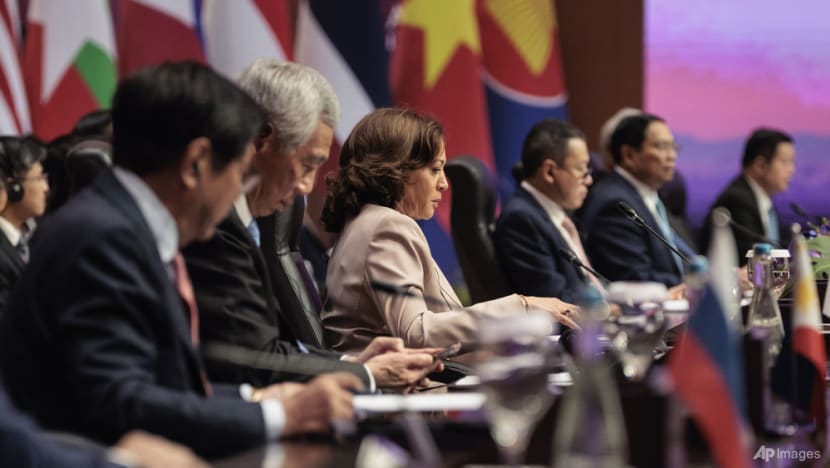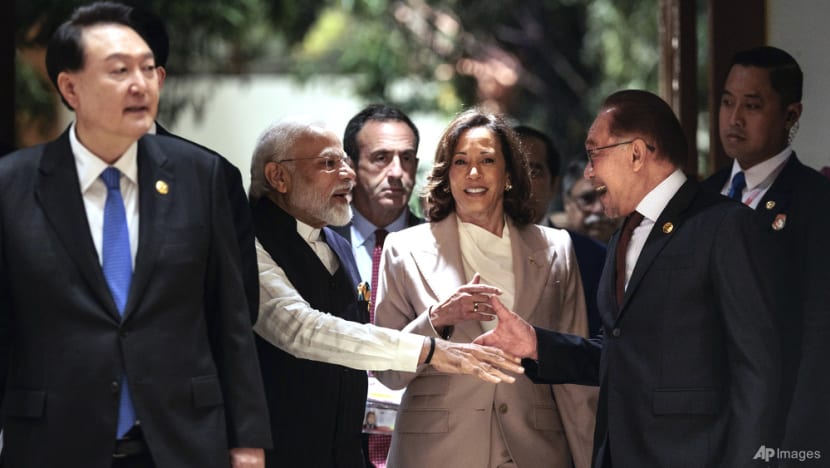Amid global tensions, PM Lee urges ASEAN, major powers to foster strong Indo-Pacific cooperation with tangible projects
Global tensions have negatively affected cooperation among major powers in the East Asia Summit, which involves ASEAN and countries like the United States, China and Russia.
JAKARTA: As geopolitical tensions disrupt cooperation among major powers, Singapore Prime Minister Lee Hsien Loong said these states and the Association of Southeast Asian Nations (ASEAN) should still try to find common ground and foster strong cooperation in the Indo-Pacific with "tangible projects".
"The international environment is fraught with geopolitical tensions and economic uncertainty," Mr Lee said on Thursday (Sep 7) at the East Asia Summit (EAS) in Jakarta, referring to Russia's invasion of Ukraine as well as tensions between the United States and China.
"The global tensions have also affected EAS cooperation ... In troubled times, all the more important that we find common ground and project a credible, collective voice."
Established in 2005, the EAS comprises 18 participating countries, including the 10 ASEAN member states as well as Australia, China, India, Japan, New Zealand, South Korea, Russia and the US.
It is the only forum in the region that brings together leaders of all the key powers, Mr Lee said. Leaders engage in dialogue and cooperation on broad strategic, political and economic issues of common interest, with the aim of promoting peace, stability and economic prosperity in East Asia.
The EAS is also the first high-level encounter between US and Russian officials since a foreign ministers meeting in Jakarta in July, where US and European officials rounded on Moscow's top diplomat over the Ukraine conflict.
"Russia’s invasion of Ukraine has undermined the multilateral system. It has violated international law and vital principles enshrined in the UN Charter," Mr Lee said at the meeting, attended by Russia's Foreign Affairs Minister Sergey Lavrov.
Still, Mr Lee highlighted the ASEAN Outlook on the Indo-Pacific (AOIP) as one platform to build on the EAS, calling it "omnidirectional and inclusive".
Introduced in 2019, the AOIP is an affirmation of ASEAN's role in maintaining peace, security, stability and prosperity in the Indo-Pacific region.
The outlook aims to promote open and inclusive dialogue and cooperation in four priority areas: Maritime, economy, connectivity and sustainable development goals.

Mr Lee on Thursday called on EAS partners to take their efforts further through a collective EAS statement reaffirming the AOIP and ASEAN centrality, noting that almost all these partners have committed themselves to the AOIP through joint statements with the regional bloc.
Russia has expressed support for ASEAN centrality, but stopped short of committing to the mainstreaming of the AOIP.
Mr Lee said EAS members should "tangibly implement" the AOIP under the EAS by establishing workstreams on the AOIP’s four priority areas, so that members can contribute their expertise to develop tangible projects.
"With strong cooperation on the AOIP, EAS members can build trust and confidence to address shared challenges," he said.
INDIA'S SUPPORT "CRUCIAL" TO RESOLVE MYANMAR CRISIS
One such issue, Mr Lee noted, is the Myanmar crisis.
He encouraged EAS partners to work with and support ASEAN’s efforts to stop the violence, facilitate humanitarian assistance and engage all stakeholders, referring to terms under the Five-Point Consensus (5PC) that ASEAN has stressed as its main peace plan for Myanmar.
"I urge EAS members to use their influence to get the Myanmar military authorities to fully implement the 5PC," he said.
The 5PC includes ending the violence in Myanmar, the establishment of constructive dialogue and the appointment of a special envoy, among others.

During his intervention at the ASEAN-India Summit on Thursday, Mr Lee said India’s support is "crucial" in addressing common challenges, such as the problem of Myanmar.
"Our external partners and Myanmar’s neighbours, including India, have important roles, working with ASEAN to facilitate national reconciliation," he said at the summit, attended by Indian Prime Minister Narendra Modi.
Mr Lee said ASEAN and India should explore "concrete projects" to implement the AOIP and collaborate in emerging areas like clean energy and pandemic preparedness.
"We should also strengthen supply chain resilience and food security to address likely shocks to come," he added.
Mr Lee also said that ASEAN and India must press on with economic integration.
"We hope that the ongoing review of the ASEAN-India Trade in Goods Agreement will make it more user-friendly and trade facilitative for our businesses," he said.
AUSTRALIA'S ROLE "IMPORTANT" IN ENSURING SECURITY IN SOUTHEAST ASIA
During the ASEAN-Australia Summit also on Thursday, Mr Lee said Singapore welcomes the ASEAN-Australia Joint Leaders’ Statement on Food Security.
It reaffirms the countries' commitment to unimpeded trade and flow of food products, and to building more resilient and sustainable agrifood systems.
"The war in Ukraine and adverse weather events caused by climate change have disrupted agricultural production and food value chains," Mr Lee said at the forum, attended by Australian Prime Minister Anthony Albanese.
Mr Lee also welcomed the signing of an upgraded ASEAN-Australia-New Zealand Free Trade Area two weeks ago, which he said strengthens the countries' supply chains and reduces business costs, while setting standards for emerging areas of cooperation like the digital economy.
He noted that ASEAN has just launched negotiations on an ASEAN Digital Economy Framework Agreement and hopes to work with Australia "as a frontrunner in this field".
Separately, Mr Lee said that he hopes that ASEAN can leverage on Australia's expertise in the deployment of renewable energy.
"The Clean Energy and Climate Transition track for next year's Special Summit with Australia is thus timely," he said.
But Mr Lee also called on ASEAN and Australia to work on tangible projects under the AOIP to further underpin Australia’s role in the Indo-Pacific, even as Australia's "firm commitment" to the AOIP signals its continued support for ASEAN centrality.
"Australia’s contributions have been an important factor in ensuring the security and stability of Southeast Asia," he added.















